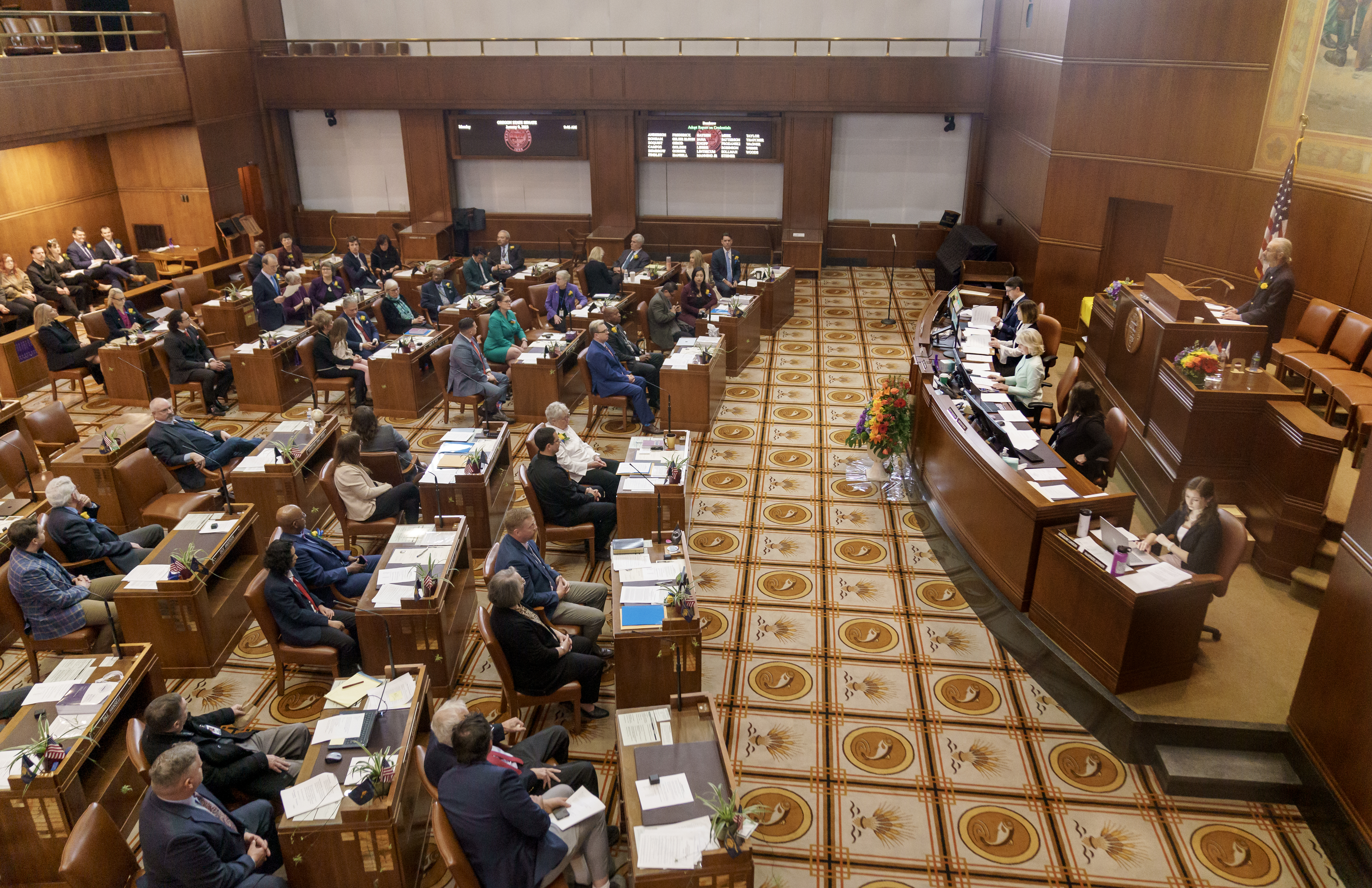
The Oregon State Senate convenes on inauguration day at the Capitol in Salem, Ore., Jan. 9, 2023.
Kristyna Wentz-Graff / OPB
Republicans in the Oregon Senate say they’ve got plenty of ideas that will benefit Oregonians, and they’re willing to slow this year’s nascent legislative session to a crawl in order to force Democrats to take them seriously.
In a press conference on Tuesday, leaders in the 12-member Senate Republican caucus laid out dozens of bills they hope to pass by the time lawmakers wrap up work this summer. The list includes several bipartisan proposals, but also many ideas that are unlikely to be palatable to Democrats, who retain majorities in both chambers and hold the governor’s office.
So even as they preached a vision of bipartisan harmony, Senate Republicans indicated they’ll begin this year’s session by employing a time-honored tactic: forcing all bills to be read in full before they can get a final vote on the Senate floor.
“If our colleagues in the Democrat majority want a bipartisan Legislature, we’re all in,” said Senate Minority Leader Tim Knopp, R-Bend, “If they just want to run a national progressive agenda of Nancy Pelosi and [U.S. Rep. Alexandria Ocasio-Cortez], we’re gonna fight them to the last breath of this session.”
Oregon’s Constitution requires that all bills be read in full before passage — a rule that can only be waived by a vote of two-thirds of lawmakers, and which drastically slows the pace at which the Legislature can pass new laws.

Members of the Oregon State Senate take their oath of office on inauguration day at the Capitol in Salem, Ore., Jan. 9, 2023.
Kristyna Wentz-Graff / OPB
Until relatively recently, that provision was seen as the outdated product of a time when legislation wasn’t easily accessed online. For years, it was common for lawmakers to agree to waive the rule for entire sessions, as a way to speed the passage of bills.
Lately, though, requiring bill reading has become commonplace in Salem, so much so that both the House and Senate now use computer programs to read lengthy bills when relations between the parties break down.
The party in the minority, most recently Republicans, generally uses such slow-down tactics as a way to gain leverage. In 2021, for instance, House Republicans stopped bill reading after securing a promise from then-House Speaker Tina Kotek to give them equal say in redrawing political maps — a pledge she later broke.
But Knopp would not offer specifics Tuesday when asked what Republicans might seek in order to vote to waive bill reading.
“It’s the minority’s responsibility to make sure that everyone is heard and that the majority is accountable,” Knopp said. “So we’ll determine whether they meet that as a caucus … if we feel that we’re making progress and we’re having a bipartisan session and our constituents are being listened to and included, maybe we will revisit that.”
Staff in Senate President Rob Wagner’s office had not seen a list of demands from Republicans as of Tuesday afternoon.
“My door is always open and I have been reaching out to Republicans,” Wagner, D-Lake Oswego, said in a statement. “We know there’s a lot of potential for bipartisan collaboration on housing, behavioral health, semiconductors and jobs and I am optimistic about getting things done.”
House Republicans have so far not indicated plans to require that bills be read in that chamber. A spokesperson, Claire Lynn, said Tuesday the House GOP feels it has a positive working relationship with House Speaker Dan Rayfield’s office but is reserving all its options if that relationship sours.
The announcement of likely delay tactics threatens to inject early rancor into a session in which both parties seem to agree on their priorities: housing and homelessness, mental health, addiction services, a worsening public defense crisis and more.
The roster of bills floated by Senate Republicans on Tuesday, which GOP legislators dubbed “Equitable Oregon,” featured proposals on most of those topics. But many are unpopular with Democrats, and similar ideas have failed to gain traction in successive sessions. They include bills to pare back a new business tax passed in 2019 to raise money for education, ease requirements for reducing carbon emissions, bolster the rights of gun owners, promote charter schools, and cut into the emergency authority of the governor — none of which currently feature a single Democratic sponsor.
Other bills do feature bipartisan support, including a proposal that offers tax breaks to people who rent out rooms in their homes and another to provide state funding to build housing for people with “moderate” incomes.
Knopp suggested Tuesday that Republican senators haven’t had time to get Democrats to sign onto many of their proposals. The legislative session began last week.
While Republicans signal they will gladly use delay tactics to exert influence this year, they are hamstrung from using what has recently been a more potent tool: Walking away from Salem to stop legislative action entirely.
Under a measure passed by voters in November, any lawmaker who amasses 10 or more unexcused absences during such a walkout is ineligible to run for the Legislature in the next term.
There doesn’t currently appear to be any bills in the rotation that are controversial enough to force a walkout, and Knopp said Tuesday his members had no plans to test the new rules.
A challenge “would need an aggrieved party — so someone who got more than 10 absences to have standing before there could be a lawsuit,” Knopp said. “No one’s volunteered at this point.”
